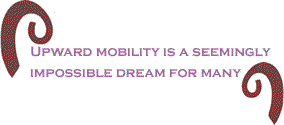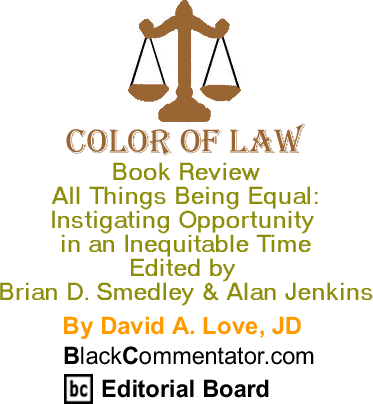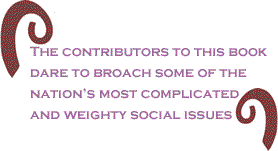
|
||||||||||||||||||||||
 |
||||||||||||||||||||||
 |
||||||||||||||||||||||
 |
||||||||||||||||||||||
 |
| The current issue is always free to everyone |
|
|
 |
 |
In this so-called land of equality and opportunity,
it seems, some people are more equal than others. Although it
has been over half a century since the historic Supreme Court
decision in Brown v. Board of Education, Upward mobility is a seemingly impossible dream for many. Wage gaps based on gender and race persist, and millions of people lack health insurance. The public education system is failing substantial numbers of our children. Institutional discrimination shows no signs of abating. And the criminal justice system rejects rehabilitation in favor of mass incarceration. Alan Jenkins
and Brian D. Smedley of The
Opportunity Agenda have edited an outstanding book which
gets to the heart of what is hurting The editors team up with civil rights lawyer
Bill Lann Lee for an introductory chapter on the scope of the
problem. In a chapter on economic inequality, Jared Bernstein
of the Economic
Policy Institute discusses the correlation between wealth,
income and opportunity across generations. A nation with less
mobility than other advanced nations, the Stanford professor Linda Darling-Hammond examines educational quality and equality, with an emphasis on the problem of broken schools, lack of access to qualified teachers, and instructional and resource disparities for students of color. Philip Tegeler, executive director of the Poverty and Race Research Action Council (PRRAC) discusses housing mobility, and the role of holistic public policy alternatives that maximize opportunities in employment, education, services, safety and health through physical location.
Marc Mauer of The
Sentencing Project analyzes Other topics covered in the book include healthcare inequality (Brian D. Smedley); discrimination in the marketplace, including persistent patterns of discrimination in housing, lending and employment (Margery Austin Turner of The Urban Institute and Carla Herbig of the U.S. Department of Justice) and educational opportunity for immigrant communities (UCLA sociology professors Edward E. Telles and Vilma Ortiz). The contributors to this book dare to broach
some of the nation’s most complicated and weighty social issues,
an ambitious undertaking to say the least. Ultimately, they
succeed in connecting the dots, in demonstrating the ways in
which these problems are interrelated, and more importantly,
are holding back the nation and stifling progress for large
segments of the population. A common thread which binds the
chapters together is public policy - the role of public policy
in creating systemic inequality of opportunity, and the need
for leadership in creating restorative public policy that upholds
human rights in All Things Being Equal is thorough yet not overbearing, scholarly and informative yet down to earth and accessible. It is required reading for people who are concerned about the worsening conditions of society, and who seek thoughtful, innovative and creative solutions for an unequal nation. BlackCommentator.com
Editorial Board member David A. Love, JD is a lawyer
and journalist based in
|
Your comments are always welcome. e-Mail re-print notice
If you send us an e-Mail message we may publish all or part of it, unless you tell us it is not for publication. You may also request that we withhold your name. Thank you very much for your readership. |
|
| March 20, 2008 Issue 269 |
|
| Executive Editor: Bill Fletcher, Jr. |
| Publisher: Peter Gamble |
| Printer Friendly Version in resizeable plain text format format |
 |
 |
 |
| |
| |






























